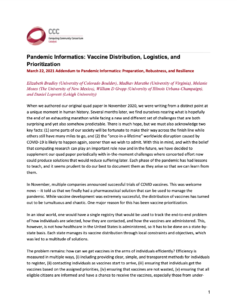 Contributions to this post were provided by Elizabeth Bradley (University of Colorado Boulder), Madhav Marathe (University of Virginia), Melanie Moses (The University of New Mexico), William D Gropp (University of Illinois Urbana-Champaign), and Daniel Lopresti (Lehigh University).
Contributions to this post were provided by Elizabeth Bradley (University of Colorado Boulder), Madhav Marathe (University of Virginia), Melanie Moses (The University of New Mexico), William D Gropp (University of Illinois Urbana-Champaign), and Daniel Lopresti (Lehigh University).
In Fall 2020, the Computing Research Association (CRA) released a series of planned white papers produced through its subcommittees (including the Computing Community Consortium (CCC)), exploring areas and issues around computing research with the potential to address national priorities over the next four years. Called Quadrennial Papers, the white papers attempt to portray a broad picture of computing research detailing potential research directions, challenges, and recommendations for policymakers and the computing research community.
One of those white papers Pandemic Informatics: Preparation, Robustness, and Resilience outlined a strategy to reduce the impact of global pandemics stressing early detection, predicting the public’s reaction and developing effective policies.
Several months later, the pandemic is still ongoing but we are facing a new and different set of challenges that are both surprising and yet also somehow predictable. The authors of the paper have produced a March 22nd, 2021 Addendum to address current issues.
In November, multiple companies announced successful trials of COVID vaccines. This was welcome news — it told us that we finally had a pharmaceutical solution that can be used to manage the pandemic. While vaccine development was extremely successful, the distribution of vaccines has turned out to be tumultuous and chaotic. One major reason for this has been vaccine prioritization.
Computer science research has the ability to solve or address a number of the issues that arose with vaccine prioritization, through automated systems and developing high-quality, scalable community-developed open-source reference designs.
See the March 22nd, 2021 Pandemic Informatics: Preparation, Robustness, and Resilience Addendum here for more details.









